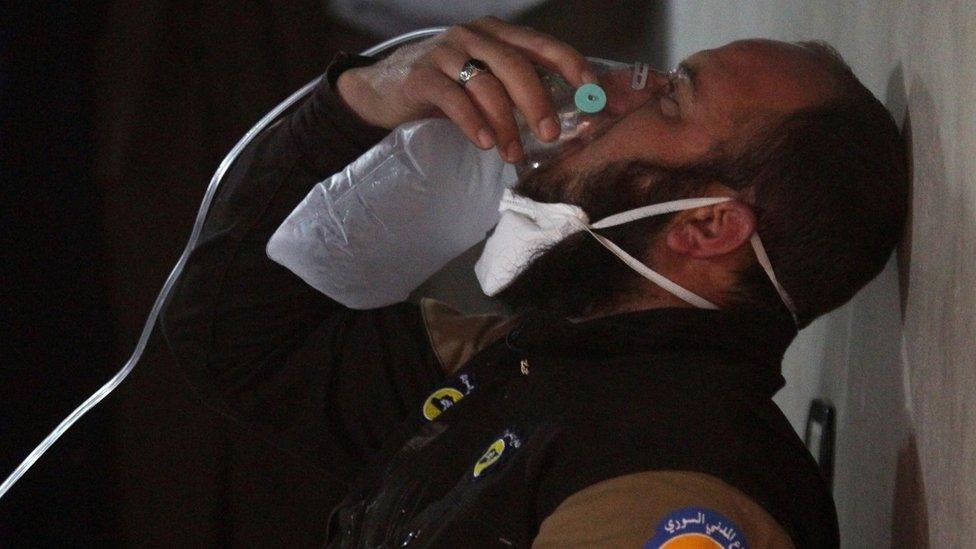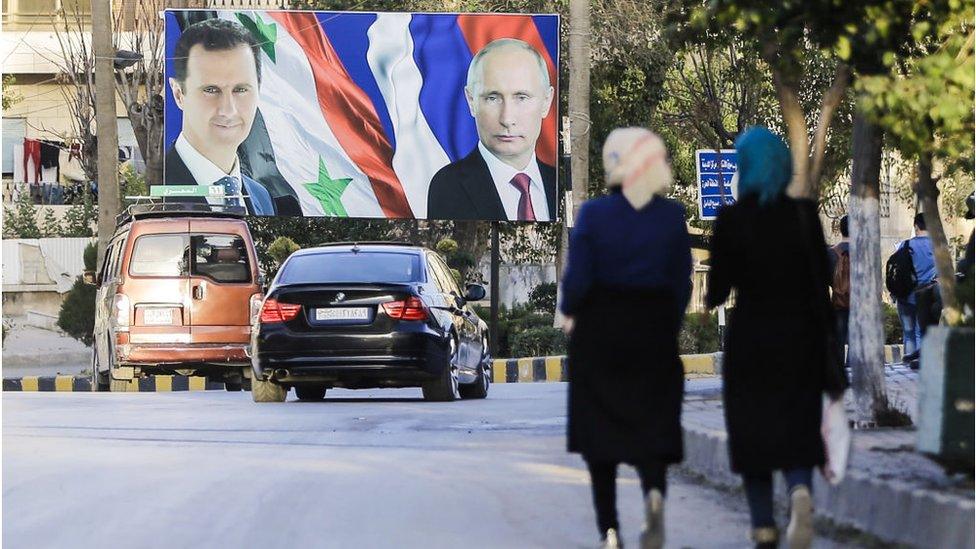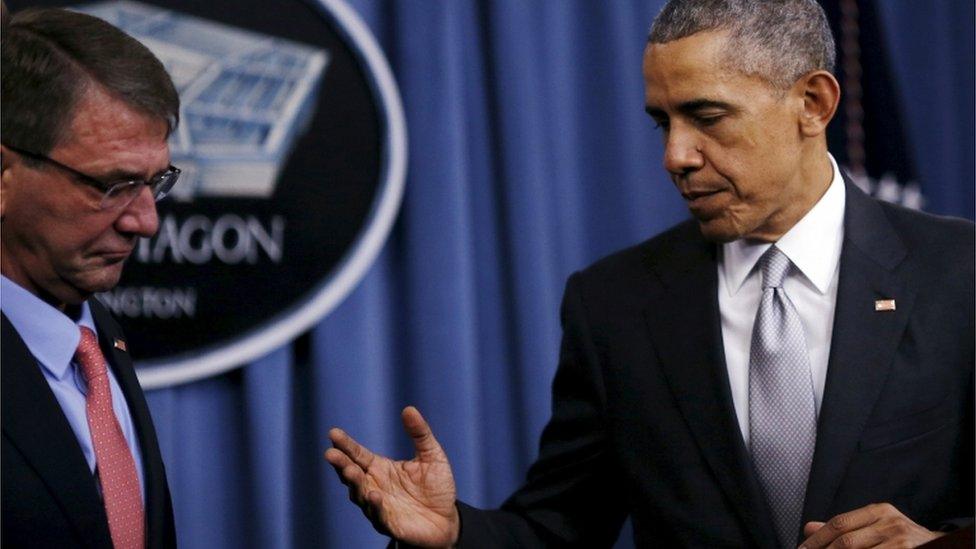Syria 'chemical attack': What now?
- Published

A Civil Defence volunteer uses an oxygen mask to help him breathe.
The response to this latest chemical "attack" in Syria will provide a measure of just how far the international community has come in struggling with the security crisis in Syria.
It also demonstrates the growing calamity in the country where the conflict moves from phase to phase, but shows no sign of ending.
Perhaps at the outset it should be established what we know. There seems no doubt that a chemical incident occurred, and there were Syrian government air attacks in the area. The opposition of course has no air force.
The West places the blame squarely on the Assad regime. Russia - one of President Assad's few allies - has a different story.
It says an air attack hit a weapons dump, thus releasing the chemical agent. All of the Western experts on chemical warfare contacted by the BBC have been highly sceptical about the Russian claim.
As yet there has been no clear analysis of samples from the location of the strike or from the victims. More information will undoubtedly become available.
Reports of the first significant use of chemical weapons - including Sarin nerve agent - by the Assad regime in 2013, prompted the international community's first purposeful diplomatic intervention in the Syrian War.
The Obama administration had marked down the use of chemical arms as "a red line", which, if crossed, would lead to serious consequences for the Assad regime.
In the event, President Obama decided to pull back and avoid military action. The US and Russia came together and brokered a deal under which the Assad regime would give up its chemical arsenal under international inspection.
Little progress
The problem of chemical weapons in Syria appeared to have been resolved. But this was not so.
Since then there have been sporadic reports of the further use of chemical weapons both by the Assad regime and so-called Islamic State. These have often involved the use of commercial chemicals like chlorine.
But this latest use of what looks to be a nerve agent like Sarin, and the frightful images of the attack, have underscored just how little progress has been made.
Rescue workers said many children were among those killed or injured in the attack
Between the Ghoutta attack in August 2013 to the incident in Idlib province this week, the situation on the ground in Syria has changed dramatically. Then the Assad regime seemed to have only a tenuous grip on power.
The policy of the West and its allies was to see Syria's leader - already branded by some as a war criminal - forced from office.
There was still a good deal of talk about a credible "democratic" opposition, which, if given sufficient means, could wrest control of much of the country from the Assad regime and IS alike.
Fast forward to today. Such hopes proved illusory.

The "democratic" opposition proved to have a very limited military capacity.
Many of its most capable elements are closely linked to al-Qaeda: the next major problem that is likely to face the West some way down the line.
The Assad regime, bolstered by Iranian military assistance and Russian air power, has more than consolidated its position.
And the most successful Western-backed elements of the opposition - the coalition of Kurdish and Arab fighters in northern Syria - may be advancing against IS, but its success brings a host of other problems, notably in relations with Turkey, whose troops and proxies already occupy a significant zone inside the country.
The saga of the West's response to the use of chemical weapons underscores the improvised and uncertain course of policy towards Syria almost from the outset.

Russia's intervention in the conflict managed to turn the tide in favour of Assad
President Obama's declaration in 2012 that the use of chemical arms would cross "a red line" and change Washington's "calculus" seemed to go further than many of his advisers had expected.
But in the event - when push came to shove in 2013 - there were no punitive air strikes and the chemical disarmament deal seems now incomplete at best.
Neither is US policy today any more coherent.
The Trump administration has roundly condemned the attacks, but President Trump himself has used the opportunity to condemn his predecessor for "weakness and irresolution" for not making good on his threats when the red line was crossed in 2013.
However, back then, Mr Trump seemed to endorse the President's caution. He tweeted on 1 September 2013 that "President Obama's weakness and indecision may have saved us from doing a horrible and very costly (in more ways than money) attack on Syria."
Diplomatic calculations
Today, the international reaction in the wake of this latest episode is predictable and formulaic.
With Russia already providing an alibi for the Syrian regime, it is hard to see what can come out of the UN Security Council's meeting. It has been consistently and fatally divided on Syria since the outset of the crisis. But the chemical attack could still change "the calculus" around Syria to use President Obama's phrase.

President Obama's failure to forcefully respond to the first chemical weapons attacks disappointed the Syrian opposition
For one thing, there will be a renewed debate about the whole question of "safe areas" and "no-fly zones" to provide protection to civilians, principally from regime air attack.
Indeed the potential for such zones - especially in northern Syria close to the border with Turkey - has increased in the wake of the Turkish Army's entry on to Syrian soil.
Such zones though are a vexed question.
At some point - however defined or delineated - they require a willingness to take action against aircraft who strike inside them. Russia's air campaign complicates matters and so far has pretty well ruled out their establishment.
The chemical attack could change diplomatic calculations as well. The Trump administration's policy on Syria is still unformed.
The last major attack in 2013 brought Washington and Moscow together, albeit briefly. So far the Trump administration's much heralded reset with Moscow has proved elusive. Could this latest tragedy - whatever its cause - change that?
The Syrian crisis has decidedly entered a new phase - with new threats and new challenges emerging.
Peace remains as elusive as ever.